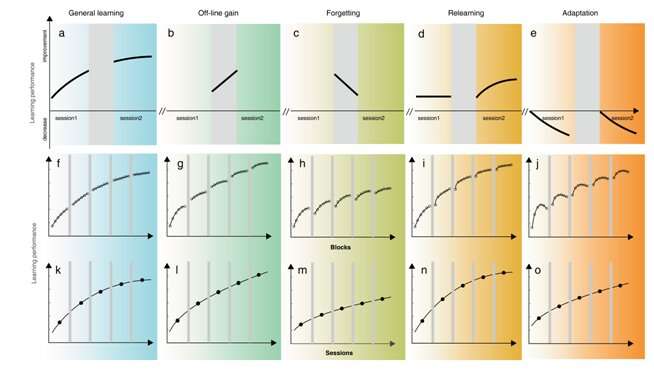New theoretical model reveals multiple component processes in perceptual learning

How repeated training or practice leads to long-term performance improvements is one of the fundamental questions in skill acquisition. Although long-term benefits of perceptual learning have been observed in a wide range of perceptual tasks, studies also documented some very interesting short-term phenomena during the learning process. However, most existing studies have focused on the average performance at the session-by-session time scale that typically involves hundreds of trials and may have missed some important short-term processes that only manifest at a finer time scale.
Dr. Yang Jia and her colleagues, under the guidance of Prof. Huang Changbing from the Institute of Psychology of the Chinese Academy of Sciences and Prof. Lu Zhonglin at New York University Shanghai and New York University, have developed a multicomponent theoretical framework to model and identify contributions of multiple long and short-term processes in perceptual learning.
The researchers proposed three hypotheses. The first one is that improved perceptual-task performance through training reflects cumulative effects of both long- and short-term processes. The second hypothesis is that finer grained analysis on block-by-block (e.g., tens of trials) learning curves may reveal short-term effects that have been obscured in the traditional coarse session-by-session analysis. Last but not least, different training tasks may engage different long- and short-term processes.
To examine these hypotheses, they applied the multicomponent model to analyze the fine-grained block-by-block learning curves from a multiple-task perceptual learning experiment, in which 49 participants were trained in seven perceptual tasks in 35 daily sessions.
In addition to the ubiquitous long-term general learning in all tasks, the multicomponent model identified a number of short-term processes: within-session relearning in all tasks; between- session forgetting in the vernier-offset discrimination, face-view discrimination, and auditory-frequency discrimination tasks; between-session off-line gain in the visual shape search task; and within-session adaptation and both between-session forgetting and off-line gain in the contrast detection task.
The fine-grained analysis of the learning curves with the multicomponent model provided a more comprehensive characterization of the time course of perceptual learning.
The model provides not only a new framework for identifying component processes in perceptual learning but may also be used to optimize learning outcomes in normal and clinical populations.
This work entitled "Identifying Long- and Short-Term processes in Perceptual Learning" was published online in Psychological Science.
More information: Jia Yang et al, Identifying Long- and Short-Term Processes in Perceptual Learning, Psychological Science (2022). DOI: 10.1177/09567976211056620
Journal information: Psychological Science
Provided by Chinese Academy of Sciences



















